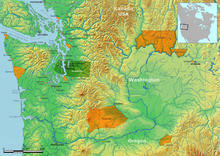
Back Duwamišové Czech Duwamish German Duwamish (tribu) Spanish Duwamish Basque دووامیش Persian Duwamish (tribu) French Duwamish Croatian Duwamish NDS Duwamish Serbo-Croatian
dxʷdəwʔabš | |
|---|---|
 Duwamish territory shown highlighted in green. Orange blocks are current Indian reservations | |
| Total population | |
| About 351 (1854),[1] unknown but more than 600 (2023)[2] | |
| Regions with significant populations | |
| Western Washington, United States | |
| Languages | |
| Lushootseed (Southern), English | |
| Religion | |
| Indigenous folk religion, Christianity, including syncretic forms | |
| Related ethnic groups | |
| Other Lushootseed-speaking peoples |
The Duwamish (Lushootseed: dxʷdəwʔabš,[3] [dxʷdəwʔɑbʃ]) are a Lushootseed-speaking Southern Coast Salish people in western Washington, and the Indigenous people of metropolitan Seattle.
Prior to colonization, the center of Duwamish society was around the Black and Duwamish rivers in Washington. The modern Duwamish primarily descend from two separate groups: the dxʷdəwʔabš, or Duwamish, and the x̌ačuʔabš, a group of peoples whose traditional territory extends around Lake Washington. Although the primary language used by the Duwamish today is English, the Duwamish historically spoke a subdialect of the southern dialect of Lushootseed, a Coast Salish language spoken throughout much of western Washington.
For centuries the Duwamish were living in at least 17 villages around the Seattle area. In 1855, the Duwamish were among the signatories of the 1855 Treaty of Point Elliott, in which they ceded their land to the United States government and in return would remove to reservation lands established by the treaty. Two reservations were created for the Duwamish: the Muckleshoot and Suquamish reservations. However, no reservation was ever created directly in the Duwamish homeland. Since then, although many Duwamish did move to the reservations, many others did not, preferring to remain in their homelands, creating a schism between Duwamish descendants. Today, the Duwamish, including the modern tribes descended from the aboriginal Duwamish such as the Suquamish Nation,[4] the Muckleshoot Indian Tribe,[5] and the unrecognized Duwamish Tribe, have been a large part of the modern history of the Seattle area, continuing to advocate for their treaty rights and the preservation and revitalization of their culture, language, and land.
Duwamish people today are enrolled in several different tribes. These include the unrecognized Duwamish Tribe and the federally recognized tribes:[6]
- Lummi Tribe of the Lummi Reservation
- Muckleshoot Indian Tribe
- Suquamish Indian Tribe of the Port Madison Reservation
- Swinomish Indian Tribal Community
- Tulalip Tribes of Washington
- ^ Deer 1996, p. 9.
- ^ Cite error: The named reference
Grygiel2009was invoked but never defined (see the help page). - ^ Bates, Dawn; Hess, Thom; Hilbert, Vi (1994). Lushootseed Dictionary. Seattle: University of Washington Press. p. 80. ISBN 978-0-295-97323-4. OCLC 29877333.
- ^ "History & Culture". The Suquamish Tribe. Retrieved October 2, 2023.
- ^ "Muckleshoot History". Muckleshoot Indian Tribe. Retrieved October 2, 2023.
- ^ McCaleb, Neal A. (September 25, 2001). "Summary Under the Criteria and Evidence for Final Determination under 25 C.F.R. 83 for the Duwamish Tribal Organization" (PDF). Office of Federal Acknowledgment. U.S. Department of the Interior. p. 1. Retrieved December 26, 2023.
© MMXXIII Rich X Search. We shall prevail. All rights reserved. Rich X Search